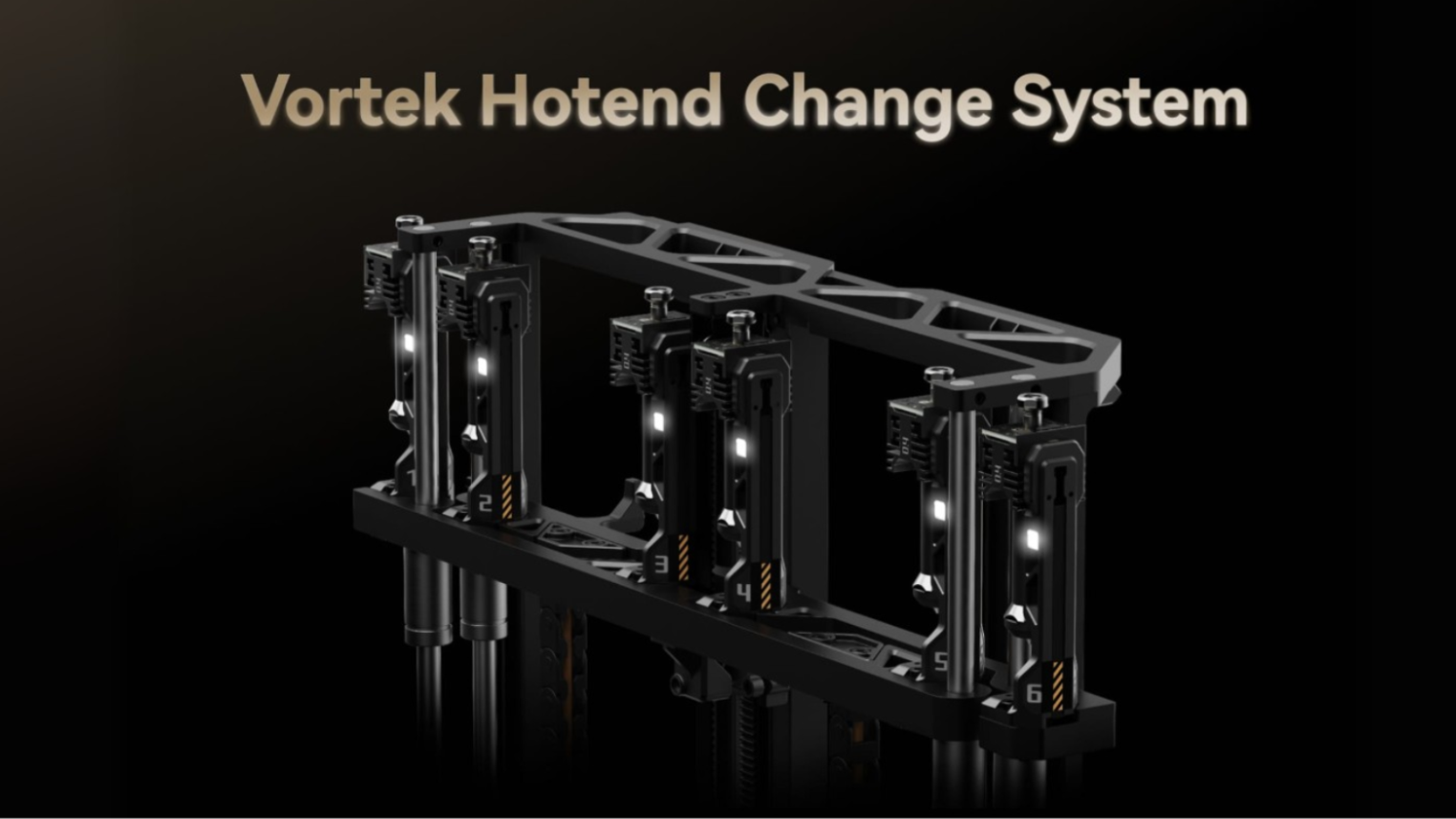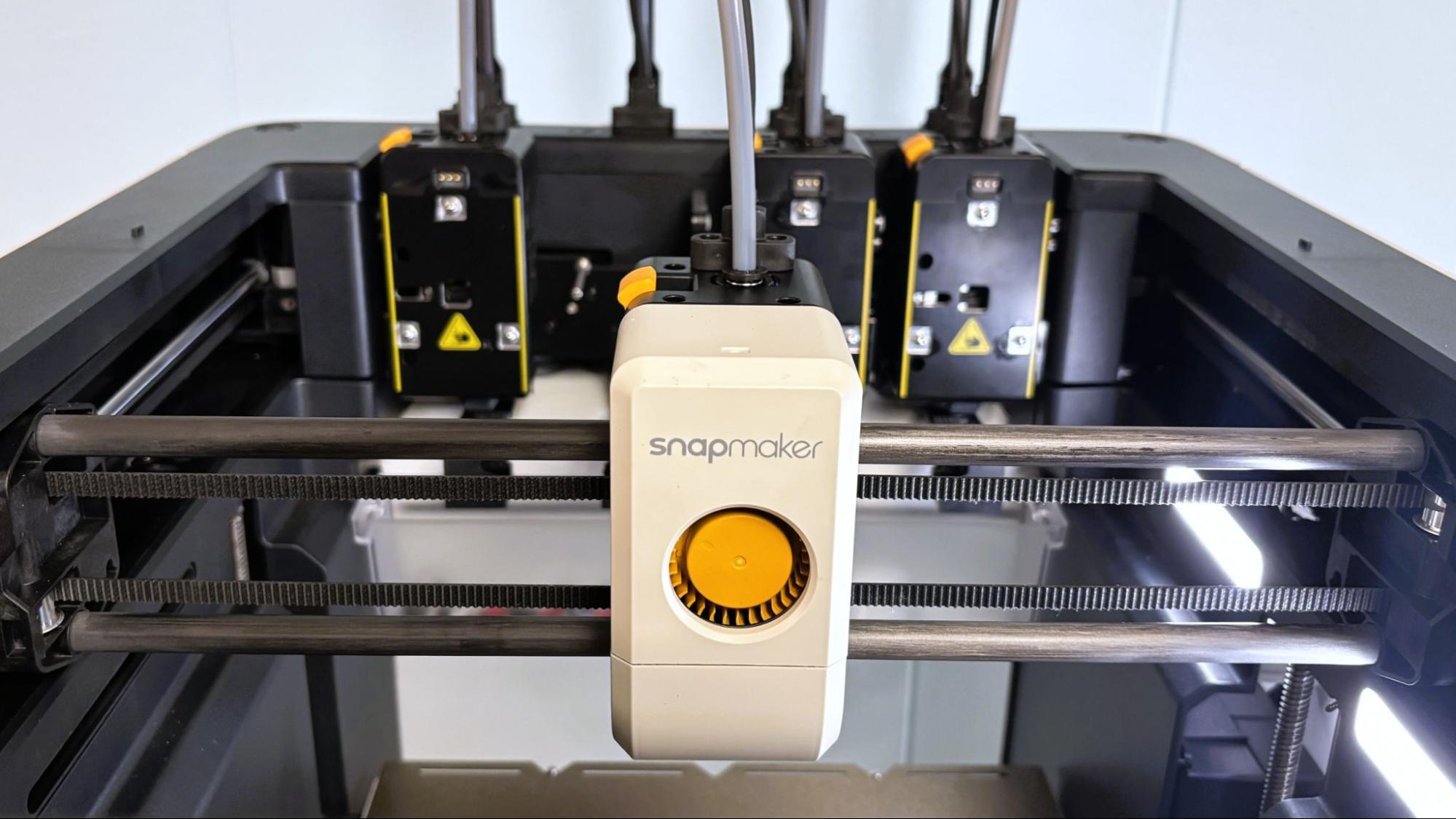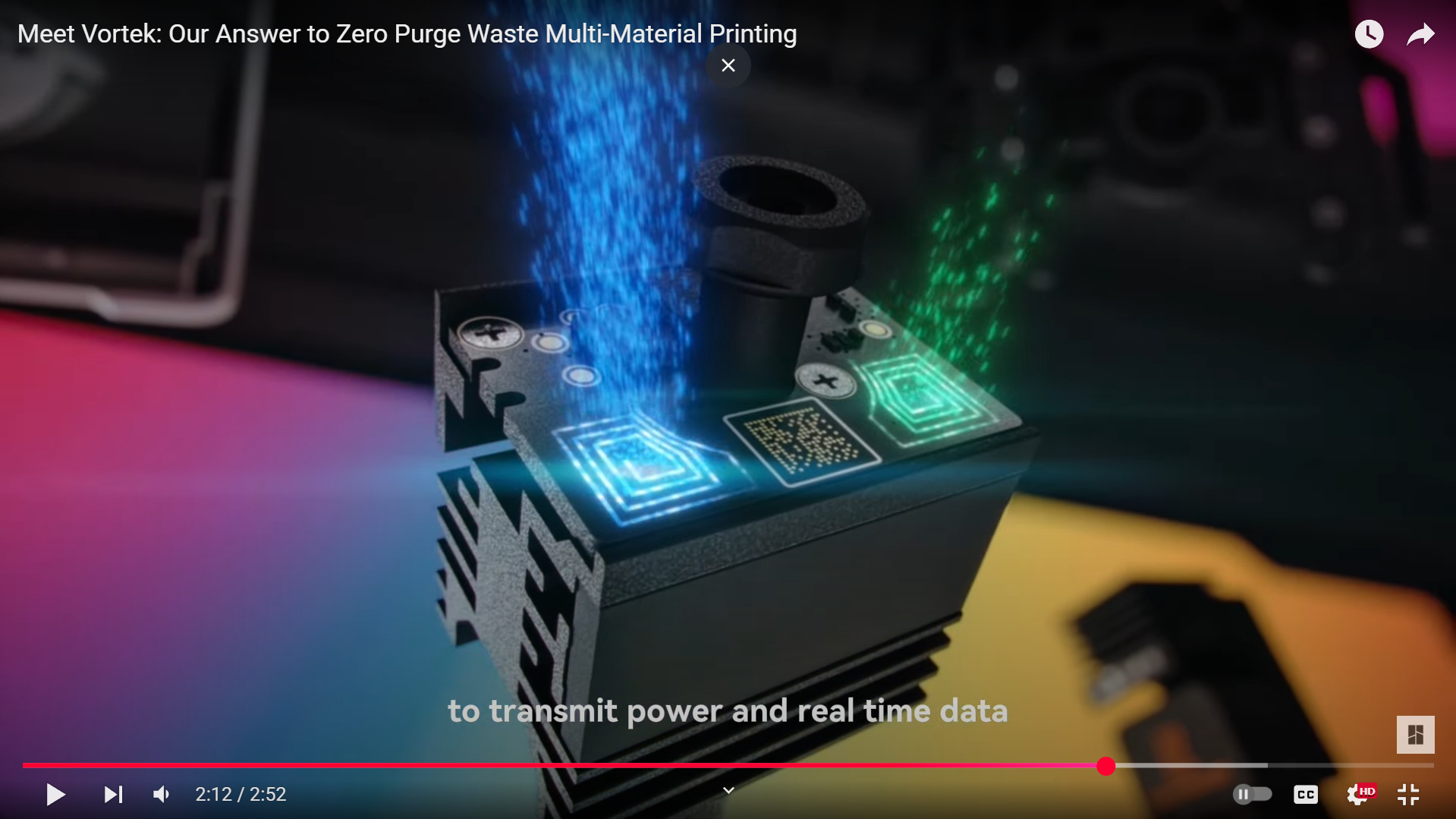Hot on the heels of the H2S, Bambu Lab announces the seven-color, wireless nozzle-swapping Vortek H2C
Bambu Lab’s next printer will be a wireless tool changer.

Bambu Lab dropped a bombshell announcement just one hour after the release of its newest 3D printer, the H2S. The company revealed the H2C, a tool changer-like system that it says will hit the shelves before Christmas.
The H2C promises to tackle the problem that plagues every Bambu Lab 3D printer with an AMS: printer poop. This “poop” is the waste purged from the nozzle as it is cleaned between color changes. Most color systems for 3D printers have multiple spools connected to one tool head, with one shared nozzle. Because it’s impossible to remove all the melted plastic from a hot nozzle, a certain amount is pushed through the nozzle as waste.
Prusa Research’s MMU system minimizes waste by yanking back the majority of the old color. The other option is a tool changer, like Prusa Research’s XL or the Snapmaker U1. Tool changers solve the problem by having multiple tool heads, with one for every color.

Bambu Lab proposes a new system, similar to a tool changer, that swaps only the nozzle. This system builds on the easily swappable nozzle design introduced with the A1 and carried over to the H2D and H2S. These machines use nozzles that are attached magnetically, and already uses thermal induction to heat up. All that was left was figuring out how to remove the wires needed for the thermistor, which regulates the temperature.
This is where Bambu Lab’s research gets truly innovative: Engineers have added a chip to the nozzle to transmit all the data the printer needs wirelessly. This allows the 3D printer to change its own nozzle robotically.

This approach allows the printer to swap the critical part of the hotend (the nozzle) without needing to flush out every bit of plastic, like a painter using a separate brush for every color of paint. Letting the nozzles stay “dirty” eliminates the need for purge waste, much like the H2D can do with two colors and it’s dual nozzle system. It would also allow Bambu to continue to use its AMS box to hold multiple spools safe and dry.
Dr. Ye Tao, Bambu Lab’s CEO, writing as the Spaghetti Monster, said in a blog post that the decision to make this announcement was difficult, as it could cut into sales of the H2D and H2S. He wanted customers to know that a new machine is on the horizon so they do not regret their purchasing choice. He also said the H2D and H2S could be upgraded to an H2C with “some skill, patience, a willingness to carefully follow instructions, and a few hours of your time.”
Get Tom's Hardware's best news and in-depth reviews, straight to your inbox.
The price of the H2C wasn't revealed, but it's likely to be significantly more than the H2D, as it requires more moving parts, a new hotend assembly, and a bank of wireless nozzles.
Tom’s Hardware is already on the list to review the H2C, so stay tuned, and we will let you know if wireless tool changers are the next great invention or a flash in the pan.
Follow Tom's Hardware on Google News to get our up-to-date news, analysis, and reviews in your feeds. Make sure to click the Follow button.

Denise Bertacchi is a Contributing Writer for Tom’s Hardware US, covering 3D printing. Denise has been crafting with PCs since she discovered Print Shop had clip art on her Apple IIe. She loves reviewing 3D printers because she can mix all her passions: printing, photography, and writing.
-
S58_is_the_goat Wow strange announcement, seems competition forced them to do this. They don't want everyone to snap up the snapmaker i guess.Reply -
USAFRet Reply
How is it 'strange'?S58_is_the_goat said:Wow strange announcement, seems competition forced them to do this. They don't want everyone to snap up the snapmaker i guess.
They've come up with a sort of similar config, and want people to know about it. -
S58_is_the_goat Reply
I explained why it was strange, seems they don't want people buying other printers so here's a little hint of what we're upto. They never did that before.USAFRet said:How is it 'strange'?
They've come up with a sort of similar config, and want people to know about it. -
USAFRet Reply
Of course they want people to buy their product vs the other guy.S58_is_the_goat said:I explained why it was strange, seems they don't want people buying other printers so here's a little hint of what we're upto. They never did that before.
Never before?
Like a kickstarter for the X1C? -
USAFRet Reply
And a LOT of FDM users are at the hobbyist level. Like me.CreatorGamer said:Does Bambu Lab and Tom's Hardware ever consider real FDM pros don't even bother with elementary PLA and are using much higher temperature and more durable filaments as the norm?
I have an X1C. Great printer. The 6th in a long line of other makes/models.
If this isn't up to your pro level printing, fine. Its not for everyone.
People said the same about the X1C and AMS when it was first announced.CreatorGamer said:This just seems like another rushed untested product for pure profit. -
USAFRet My printers, in order:Reply
M3D Microhttps://www.printerplayground.com/m3d-micro-3d-printer
Bibo Dual headhttps://all3dp.com/1/bibo-3d-printer-review-specs/
CraneQuadhttps://3dprinterexchange.com/products/m3d-the-crane-quad-3d-printer
Ender 3 S1 Pro (still have it, on the shelf due to space constraints)
Ender 3 Max (still have it, on the shelf due to space constraints)
Bambu X1C (Daily driver)
The CraneQuad printed great, when it worked right.
FAR too much touch maintenance needed. Sold it and bought one of the Enders.
The X1 C has been flawless since day 1. -
S58_is_the_goat Reply
First product launch? Come on...USAFRet said:Of course they want people to buy their product vs the other guy.
Never before?
Like a kickstarter for the X1C? -
USAFRet Reply
Entirely unsure of what you're trying to say here.S58_is_the_goat said:First product launch? Come on... -
jp7189 Reply
There are magnet formulations that work well at higher temps. I personally use strontium cobalt in 3d printers and alnico maintains magnetism to 650C. I don't know what Bambu uses, but it's an entirely solveable problem.CreatorGamer said:So, my first comment here, but I have to point out a lot of critical drawbacks in terms of design principle.
Magnets of an affordable quality generally lose their effectiveness over time due to excessive heat exposure past a specific temperature (I still wonder about how long the magnetism lasts on my P1S bed given I always run it at 100C). I've had the magnetic cover of my stock toolhead fall off multiple times during printing due to excessive heat (a well known issue). Solved it on my own with a combination of Kapton tape and making my own enclosure with temperature sensitive exhaust fan.
Next, wireless toolheads??? So do they require a battery or a large capacitor to transmit when theres a filament change while not actively "connected"? Batteries and capacitors degrade quickly in hot environments...
If not those "wireless" drawbacks, how about the constant conductive contacts they have to connect with over and over again and how often do you have to replace them?
Seems like the more moving parts you have in an already cheaply made FDM printer, the more you have to spend down the line just to keep ONE SINGLE printer up and running optimal (for PLA?).
Does Bambu Lab and Tom's Hardware ever consider real FDM pros don't even bother with elementary PLA and are using much higher temperature and more durable filaments as the norm?
Not everything can be automated in life to get the best results... unless the system is very fine tuned and very rigidly/sturdily manufactured, which means exorbitantly high price.
This just seems like another rushed untested product for pure profit. I'm never purchasing Bambu Lab products again given their recent firmware update fiasco.
Just my two cents.
Re: wireless, again I'm not sure what Bambu has done here, by rfid is wireless, contact less, no batteries, no charging, and already in use on spools of filament. Not hard to imagine they could just slap an rfid sticker on a nozzle and call it a day, though i would hope for something a little more refined.